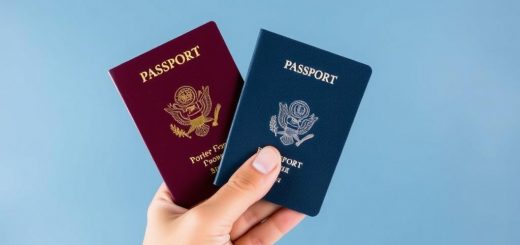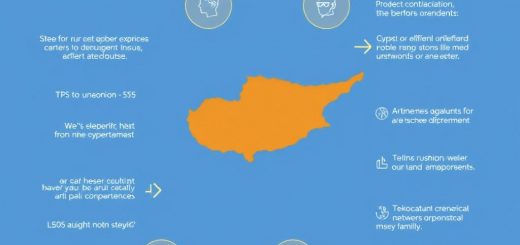Work Permits in Cyprus: Types and Application Requirements
Cyprus stands as a strategic gateway between Europe, the Middle East, and North Africa, attracting a diverse workforce seeking new opportunities in a growing economy. Whether it’s multinational corporations, small startups, or the tourism sector, the demand for foreign professionals has increased significantly. With this rising influx, understanding the nuances of work permits in Cyprus is essential for those aiming to secure lawful employment within its borders. Comprehending different visa categories, employment permit Cyprus processes, and specific work authorization Cyprus procedures can define the success of an expatriate’s career journey.
This article delves into all aspects of work permits in Cyprus, analyzing the types available to foreign workers, the application process, eligibility criteria, and key employment visa requirements Cyprus applicants must satisfy. Whether you are a highly skilled professional, an intra-company transferee, or a seasonal worker, clarity on Cyprus’s job visa regulations can streamline your move and avoid costly legal pitfalls.
Overview of Cyprus Work Visa Framework
Cyprus’s legal framework for foreign workers is shaped both by its membership in the European Union and national legislation. EU citizens have relative freedom of movement and do not usually require work permits to take up employment. However, non-EU nationals must undergo a strict process involving work permits and residence visas before starting any job in Cyprus.
The “Cyprus work visa” term generally refers to the combination of an employment visa and a valid residence permit granted to foreign nationals after meeting all legal and procedural prerequisites. By law, any foreign worker intending to work in Cyprus must obtain authorization, confirmed through the employment permit Cyprus system before employment officially begins.
Securing a Cyprus work visa is a mandatory legal step for non-EU nationals aiming to work legally and stay long-term in the country.
The Cyprus government classifies work permits into several categories, based on the applicant’s job, duration, and nature of employment. These classifications govern the permissible work activities, visa length, and renewal options. Each category has specific employment visa requirements Cyprus applicants need to fulfill, including employer sponsorship and justified labor market needs.
Types of Work Permits and Job Visas in Cyprus
The variety of work permits in Cyprus caters to multiple employment scenarios. Understanding these distinctions is critical to applying under the correct category and ensuring compliance with Cyprus immigration laws.
1. Category A Employment Permit
This category serves unskilled or low-skilled workers in sectors facing labor shortages like agriculture, hospitality, and construction. Applicants usually come from non-EU countries with limited local competition. The permit allows employment for up to one year and is renewable based on ongoing needs.
2. Category B Employment Permit
Category B targets skilled or specialized workers, including professionals in IT, engineering, health, and education. This category demands a higher level of qualification and stronger employer justification to demonstrate a shortage of local talent. Permits here offer longer validity periods, typically one to three years, and are renewable.
3. Category C and D Employment Permits
These categories cover specialized areas, such as intra-company transferees, researchers, and executives. Permits under Category C and D are granted to employees transferred from a multinational company’s foreign branch or professionals with niche expertise. Such permits usually cater to mid to long-term employment, often with accompanying residence rights for family members.
4. Seasonal Work Permits
Seasonal permits are for temporary workers in tourism, agriculture, and other seasonal industries. Workers receive authorization for a limited period, reflecting the temporary nature of their employment. Seasonal permits help fill critical gaps without granting long-term residency rights.
| Permit Category | Target Group | Validity | Typical Sectors |
|---|---|---|---|
| Category A | Unskilled, Low-skilled Workers | Up to 1 year | Agriculture, Hospitality, Construction |
| Category B | Skilled Professionals | 1-3 years | IT, Engineering, Healthcare, Education |
| Category C & D | Intra-company Transfers, Executives | Mid to Long term | Multinationals, Research |
| Seasonal Work Permits | Temporary Seasonal Workers | Limited duration | Tourism, Agriculture |
Choosing the correct work permit category aligns your application with Cyprus’s labor needs and maximizes your employment opportunities.
Eligibility and Employment Visa Requirements Cyprus Applicants Must Meet
Meeting the employment visa requirements Cyprus enforces is crucial for obtaining work authorization Cyprus authorities can approve. Applicants must prove their qualifications, clean record, and that their employment will not adversely impact the local labor market.
For most non-EU applicants, eligibility conditions include:
- Having a valid job offer or employment contract from a registered Cyprus employer.
- Demonstration by the employer that no suitable local or EU candidate is available for the position.
- Proof of relevant professional qualifications, diplomas, or licenses.
- Passing security and criminal background checks.
- Meeting health and medical examination requirements set by Cyprus immigration authorities.
Additional criteria can apply depending on the work permit category. For instance, intra-company transferees must show a connection to the parent company abroad, and seasonal workers usually require specific contracts limited by sectoral regulations.
Employment visa requirements Cyprus mandates are designed to balance foreign workforce integration with protection for the domestic labor market.
Employers play a pivotal role in this framework, as most employment permit Cyprus applications require firm sponsorship by the Cypriot company offering the job. The employer must submit detailed paperwork verifying the recruitment process and demonstrating compliance with labor laws. This sponsorship is a key pillar of the work authorization Cyprus system and ensures accountability.
Step-by-Step Application Procedure for Employment Permits in Cyprus
Applying for a Cyprus work visa can be a meticulous process, demanding precise documentation and adherence to timelines. The following outlines the core steps each applicant must follow to obtain an employment permit Cyprus officials will validate.
Step 1: Secure a Job Offer and Employer Sponsorship
The initial requirement is obtaining a legitimate job offer from a registered employer in Cyprus. The employer acts as the sponsor, and their involvement is indispensable throughout the application. Many employers assist candidates by guiding them through the administrative process.
Step 2: Gather Required Documentation
Applicants must prepare a portfolio of essential documents which typically includes:
- Valid passport or travel document.
- Signed employment contract or official job offer letter.
- Proof of qualifications and professional experience.
- Medical certificates and criminal background checks.
- Completed application forms specific to the work permit category.
Ensuring completeness and accuracy of these documents reduces delays in processing.
Step 3: Employer Submits Employment Permit Application
The employer formally submits the application to the Civil Registry and Migration Department in Cyprus or the relevant Immigration Service. This submission contains the employer’s assurance that all legal conditions regarding the job and hiring have been met.
Step 4: Application Processing and Approval
The authorities evaluate the application focusing on labor market tests, applicant eligibility, and compliance with immigration laws. Processing times vary depending on workload and complexity, but applicants should expect several weeks to months.
Step 5: Receiving the Employment Permit and Applying for the Visa
Once approved, the applicant receives the official employment permit. Non-EU nationals must then apply for a national visa (D visa) at the nearest Cyprus consulate or embassy abroad. This visa permits entry to Cyprus for work purposes.
Step 6: Arrival and Obtaining Residence Permit
Upon arrival, foreign workers must register with local authorities and apply for a residence permit, completing their legal status for the duration of employment.
Timely and careful adherence to each procedural step ensures a smoother and more predictable path toward obtaining legal work status in Cyprus.
Special Considerations: Work Authorization Cyprus for EU vs. Non-EU Nationals
Cyprus distinguishes between EU and non-EU nationals in work authorization Cyprus regulations. EU citizens enjoy the right to work without a visa or permit under the principle of free movement. They only need to register with authorities if their stay exceeds 90 days, proving employment or self-employment status.
Conversely, non-EU nationals face more stringent requirements. They must obtain an employment permit Cyprus before entering and working in Cyprus. Failure to do so results in legal penalties, including fines and possible deportation.
Another important consideration is visa renewal and permit extension. EU nationals have more flexible options, while non-EU workers must maintain valid permits and renew well before expiry to avoid interruptions in their work authorization Cyprus grant.
Understanding your nationality’s impact on Cyprus work visa requirements can save time and help ensure compliance with local regulations.
The Role of Labor Market Tests and Employer Obligations
Labor market tests are a cornerstone of Cyprus’s employment visa requirements Cyprus enforces. Before issuing work permits, the government requires employers to prove that no qualified local or EU candidate is available for the position. This system protects local workers and ensures foreign labor complements rather than replaces domestic employment.
Employers must advertise vacancies publicly and provide evidence of these efforts during the application process. This requirement enhances transparency and fairness in hiring practices.
Beyond the initial test, employers are legally bound to respect employment conditions, including minimum wages, working hours, and social security contributions. These obligations maintain the integrity of Cyprus’s labor market and social welfare system.
Labor market tests ensure that Cyprus prioritizes its workforce while allowing essential foreign skills to fill genuine gaps.
Practical Challenges and Tips for Successful Work Permit Applications
Many applicants encounter common obstacles when applying for Cyprus work permits. These include incomplete documentation, delays due to inaccurate translations, and misunderstandings about permit category suitability. Additionally, navigating bureaucracy can be daunting for those unfamiliar with Cyprus’s immigration protocols.
To increase success rates, applicants should:
- Verify all documents meet official standards and are properly translated and certified.
- Submit applications well in advance of intended start dates.
- Maintain transparent communication with employers and immigration authorities.
- Consult legal or immigration experts when in doubt.
- Ensure compliance with health and criminal background requirements.
The proactive approach prevents rejection and facilitates faster processing, allowing migrants to focus on job integration and life in Cyprus.
Preparation, accuracy, and patience are key to successfully navigating Cyprus’s complex work permit application landscape.
Digital and Post-Pandemic Transformations in Cyprus Work Visa Processes
Recent years have seen Cyprus’s immigration processes increasingly embrace digitalization, streamlining application submissions and communications. Electronic platforms now allow employers and applicants to track permit status and upload necessary documents, enhancing transparency and efficiency.
The COVID-19 pandemic underscored the need for remote, contactless procedures, leading to permanent changes in application frameworks. Virtual interviews, online document verification, and remote biometrics appointments have reduced physical visits.
However, these modernizations also require greater digital literacy from applicants, and some may face barriers due to language or technology access. As the system evolves, Cyprus continues balancing convenience with security and fraud prevention.
The shift toward digital work visa processing in Cyprus reflects wider global trends, emphasizing speed and accessibility while maintaining regulatory rigor.
Beyond Permits: Integrating into the Cyprus Labor Market
Obtaining a work authorization Cyprus is only the initial step for foreign workers. Successful integration demands cultural awareness, language acquisition, and understanding local labor laws. Many companies offer orientation programs or mentorship to assist expatriates in adapting.
Moreover, Cyprus’s labor market encourages continuous skill development, with opportunities for vocational training and advancement. Understanding employee rights, social security benefits, and taxation is equally important for a smooth transition.
Networking within professional communities and local business associations can enhance career prospects and provide social support. Ultimately, adapting to Cyprus’s unique work environment fosters long-term employment stability.
Work authorization is the gateway; successful integration secures your foothold in Cyprus’s dynamic workforce.
Charting Your Path: Navigating Work Permits in Cyprus with Confidence
Cyprus offers a compelling environment for foreign professionals seeking career advancement in a vibrant Mediterranean setting. However, the labyrinth of work permits, employment visa requirements Cyprus applicants must satisfy, and complex regulatory frameworks requires diligent attention and strategic planning.
Understanding the distinct types of job visas Cyprus offers, matching your profile with the appropriate category, and meticulously compiling required documentation sets the foundation. Engaging closely with your employer to navigate labor market tests and sponsor applications ensures legal clarity. Staying informed about evolving policies and technological innovations further equips you to adjust swiftly to changes.
Cyprus does not merely issue work permits; it demands responsible participation from both employers and employees to maintain an equitable labor market balance while welcoming foreign talent. Embrace the process with patience and precision, and Cyprus will open the doors to professional and personal growth in an extraordinary locale.
Your journey to a Cyprus work visa is a challenging but rewarding endeavor that marks the start of new professional horizons and cultural experiences.
Frequently Asked Questions
- What is the difference between a Cyprus work visa and an employment permit?
A Cyprus work visa generally refers to the visa that allows entry and stay for work purposes, while the employment permit is the official authorization to work issued by Cyprus authorities. Both are needed for non-EU nationals. - Can EU citizens work in Cyprus without a work permit?
Yes, EU citizens have the right to work in Cyprus without obtaining a work permit but must register with local authorities if staying longer than 90 days. - What are the main documents required to apply for a work permit in Cyprus?
Key documents include a valid passport, employment contract, proof of qualifications, medical certificate, criminal background check, and completed application forms. - How long does it typically take to get approval for an employment permit Cyprus?
Processing times vary but generally range from a few weeks up to several months depending on the permit category and workload of the authorities. - Do seasonal workers need a different work permit in Cyprus?
Yes, seasonal workers require specific seasonal work permits that allow temporary employment linked to particular industries such as tourism or agriculture. - Is it mandatory for the employer to sponsor the work permit application?
Yes, most employment permit applications in Cyprus must be sponsored by a registered employer who assumes legal responsibility for the worker. - Can an employment permit Cyprus be renewed or extended?
Yes, permits can often be renewed or extended depending on the ongoing employment situation and adherence to visa conditions.



